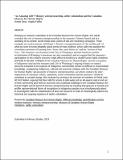| dc.contributor.author | Dean, Amber | |
| dc.contributor.author | Failler, Angela | |
| dc.date.accessioned | 2021-01-11T17:16:51Z | |
| dc.date.available | 2021-01-11T17:16:51Z | |
| dc.date.issued | 2019-04-22 | |
| dc.identifier.citation | Dean, Amber and Angela Failler. “‘An Amazing Gift’? Memory Entrepreneurship, Settler Colonialism and the Canadian Museum for Human Rights.” Memory Studies (published online 22 April 2019). DOI: 10.1177/1750698019843971. | en_US |
| dc.identifier.issn | 1750-6980 | |
| dc.identifier.uri | https://hdl.handle.net/10680/1887 | |
| dc.description | Accepted version of manuscript | en_US |
| dc.description.abstract | Drawing on research undertaken at the Canadian Museum for Human Rights, this article considers the role of memory entrepreneurship in the museum’s historic launch and in a sampling of its content, social media posts, points of sale and marketing campaigns. These examples are read in tension with Roger I. Simon’s conceptualization of ‘the terrible gift’ of what we come to know belatedly about events of mass violence, which calls into question the consolatory promises of learning from ‘those who came before us’ and the ‘lessons of their lives’. The museum’s involvement in the City of Winnipeg’s tourism initiatives and the revitalization of Winnipeg’s downtown are also considered, and we suggest that the museum’s participation in the creative economy might affect its tendency to situate human rights violations primarily in the past. Critiques of the Canadian Museum for Human Rights’ present occupation of Indigenous land and the museum (and City of Winnipeg)’s ongoing reliance on natural resources extracted at the expense of Indigenous communities remain as difficult or inassimilable knowledge. Juxtaposing Indigenous, cultural and economic critiques with the Canadian Museum for Human Rights’ advancement of memory entrepreneurship, our article explores the inter-implication of consumer culture, capitalism, settler colonialism and the museum’s ability to contribute to societal change. We conclude by turning to the activism of members of Shoal Lake 40 First Nation, arguing that their calls for access to safe water and an all-season road in and out of their community pose both an economic and a political challenge to the Canadian Museum for Human Rights and its brand of memory entrepreneurship by insisting that gestures to include and proffer representational forms of recognition to Indigenous peoples must simultaneously attend to sovereigntist calls for redistribution of land and resources in order to meaningfully address the historical and ongoing injustices of settler colonialism. | en_US |
| dc.description.uri | https://journals.sagepub.com/doi/10.1177/1750698019843971 | en_US |
| dc.language.iso | en | en_US |
| dc.publisher | Sage Journals | en_US |
| dc.rights | info:eu-repo/semantics/openAccess | en_US |
| dc.subject | Canadian Museum for Human Rights | en_US |
| dc.subject | Difficult knowledge | en_US |
| dc.subject | Gentrification and the creative economy | en_US |
| dc.subject | Memory entrepreneurship | en_US |
| dc.subject | Museum of Canadian Human Rights Violations | en_US |
| dc.subject | Settler colonialism | en_US |
| dc.title | ‘An Amazing Gift’? Memory Entrepreneurship, Settler Colonialism and the Canadian Museum for Human Rights | en_US |
| dc.type | Article | en_US |
| dc.rights.license | CC BY-NC-ND | en_US |
| dc.identifier.doi | 10.1177/1750698019843971 | en_US |

